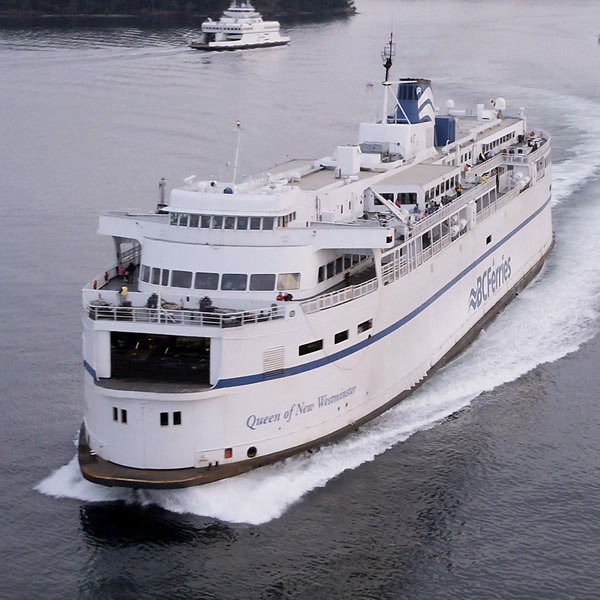The Queen of New Westminster. BC Ferries photo
Sounder News
Following the recovery of the 60-year-old Queen of New Westminster’s propeller from the seabed September 7, BC Ferries announced that repairs required to the ship will keep it out of service for approximately six months.
The ship, which was sailing the route connecting Tsawwassen to Schwartz Bay, lost its propellor near Tsawwassen around 6am on Tuesday, Sept. 3. This caused it to leak approximately 800 litres of oil into the ocean.
BC Ferries says a preliminary visual inspection seems to indicate the fracture of the propeller shaft could be related to structural fatigue.
The required repairs are anticipated to be significant and include work on both the port and starboard propeller systems before the vessel can be returned to service. This will involve the complete disassembly of both systems and the replacement of the tail shaft on at least the starboard side, which must be specially manufactured.
The vessel’s annual refit will also be conducted during this time.
BC Ferries says the ship’s return to service timing will depend heavily on global parts availability and manufacturing timelines.
Nicolas Jimenez, President and CEO of BC Ferries said, “This situation highlights the clear need for resiliency in our fleet to meet customer expectations and it’s why we will be seeking approval from the Ferry Commissioner to build and add a net new vessel to our major routes.
“If we had a backup vessel available, this incident would have had minimal impact on service. It underscores the importance of our fleet renewal strategy to ensure we have the capacity and resilience to manage unexpected issues and vessel repairs.”
The propeller, which weighs approximately 10,000 pounds, was found half-submerged in the seabed and took two days to recover, as the operation could only be conducted at night when other vessels were not traveling the route to ensure crew safety and maintain service continuity.
Stephen Jones, Vice President of Engineering said, “our skilled technical teams are leading the repair effort which will involve local dry docks and specialist contractors.
“Our teams bring decades of expertise in maintaining and repairing complex vessels like the Queen of New Westminster and we are confident we will complete these substantial repairs and return the vessel to service as quickly and safely as possible.”
The full impact on the sailing schedule is still being assessed. BC Ferries has already canceled all sailings of the Queen of New Westminster through September 30th. The company is reviewing options for where it may be able to add sailings on the route with other vessels, as well as other potential adjustments to the refit schedule.
“Our priority is to ensure we can accommodate customers on other vessels, including adding sailings on the Coastal Celebration and Coastal Renaissance where possible,” added Jimemez. “We’ll also continue maximizing the loading of existing sailings to minimize disruption.”
BC Ferries will continue to provide updates on the repair process, scheduling changes, and customer impacts as more information becomes available.
The work on the Queen of New Westminster will unofficially kick off BC Ferries’ refit season.
In October and November, seven more vessels are expected to enter their regular refit process, including the almost 50-year-old Queens of Alberni, Coquitlam and Cowichan. All three of these vessels, as well as the Queen of New Westminster, are among those set to be retired in the coming years when new major vessels arrive.
BC Ferries says it remains focused on ensuring its fleet meets all safety and regulatory standards. Every vessel undergoes a rigorous refit process to ensure that Transport Canada’s stringent Safety Inspection Certificate requirements continue to be met.
An Historic Summer of Growth
Summer 2024 is on track to be the busiest in BC Ferries’ 64-year history, with continued growth across all routes.
In June and July alone, over five million passengers and two million vehicles travelled on the ferry network.
To meet this demand, refit schedules were optimized to ensure that all vessels would be in service for the summer season, nearly 600 new employees were hired, and extra sailings were added on the most popular routes to improve service delivery. Ferries staff say the preliminary August reporting indicates that these adjustments have led to a smoother season than in previous years.
However, the challenges posed by the age of the fleet persist, which isn’t unexpected considering how long the six oldest vessels in the fleet have been in service. While operational hurdles remain, the focus remains on minimizing customer impact and maintaining open communication with passengers, while strategically planning for future demand.
RFP for vessels to service major routes coming soon
BC Ferries is implementing a comprehensive vessel renewal strategy, including the introduction of new major vessels and the planned expansion of the size of the fleet, adding one net new vessel to service the major routes.
BC Ferries says the new ships will increase capacity on the busiest routes, improving operational flexibility and reducing future disruptions.
With the ability to carry up to 360 vehicles and 2,100 passengers, the new major vessels will better meet the growing demand on the busiest routes and ensure reliable service for years to come.
The Spirit Class – which currently have the largest capacity on the major routes – can take 358 cars with 2,100 passengers and crew. The Queen of New Westminster has a capacity of 254 cars, with 1332 passengers and crew.
A Request for Proposals (RFP) for the new vessels will be posted soon, marking a significant milestone in BC Ferries’ largest-ever capital project aimed at modernizing the fleet and transforming ferry operations in British Columbia.





Recent Comments